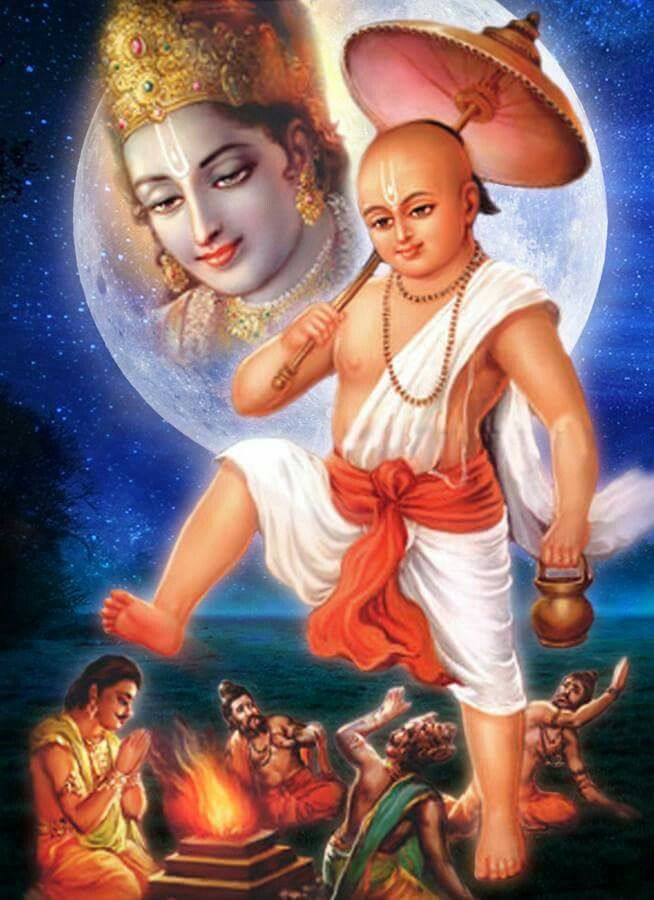Question: I would like to ask about Vamana avatar. Mahabali is a pure devotee of Krishna and he ruled with all the qualities of a king; all of his people were happy with him. But Krishna came as Vamana and removed him from the earth. Why did He do so?
In Kerala, a southern state of India, people are celebrating Onam festival to celebrate the arrival of Mahabali to visit his people. All the people are getting together to celebrate this occasion with one mind. The Christian community is utilizing this particular festival to preach against Krishna by speaking of Mahabali’s greatness. Please clarify all doubts about this particular avatar of Krishna.
Answer by Romapada Swami:
Bali Maharaja was indeed a pure devotee. In fact he is glorified in Srimad Bhagavatam as one of the 12 mahajanas or great authorities in the devotional line. Despite the glorious nature of Bali Maharaja, by external analysis it seems as if the Lord treated Bali unjustly. Actually, however, Vamanadeva’s dealings with Bali Maharaja were completely transcendental and the apparent punishment of Bali is simply a glorification of both the Lord and His pure devotee. Lord Vamana explicitly explains this Himself in Srimad Bhagavatam. He expresses His appreciation and love for Bali, and discloses that He orchestrated this whole lila just to show to the world the depth of Bali’s wonderful qualities.
Although a devotee, Bali who was the grandson of Prahlad Maharaja, was the king of the asuras. As a matter of his kingly duty, he led the demons in battle against the demigods and conquered Indra, thus becoming the ruler of the universe.
It is stated in Srimad Bhagavatam (1.3.28) that Lord Krishna always protects the pious demigods, and He incarnates to vanquish the enemies of Indra, the demons. Thus, by the prayers of Aditi, the mother of Indra, He incarnated as Vamana, to divest the asuras of their control over the heaven and give it back to Indra.
Vamanadev came to Bali Maharaja’s sacrificial arena in the form of a dwarf brahmana, begging him simply for three paces of land. Bali’s guru, Sukracharya, knowing Vamanadev’s real identity and mission, induced Bali not to promise charity. But Bali Maharaja was very happy to offer something to Vishnu, even if He came in the role of an enemy. Thus he transgressed the order of his guru. Nobody can check the worship of Lord Vishnu, and if one does, even if they may be one’s guru, they should be rejected. For showing this example, Bali is considered one of the 12 mahajanas.
Bali knew that by asking for three paces of land, Vamanadev will take the whole universe. Yet he agreed to be so-called “cheated” by the Lord. This is the symptom of a devotee. A devotee agrees to any action of the Lord. When the Lord expanded Himself as Trivikrama and covered the whole universe with two steps, he offered his own head for the third pace. Thus by giving everything to Lord Vishnu, he purchased the Lord. Even under extreme tribulation — having lost everything and being humiliated and rejected by his own guru and even family members – Bali was not resentful in the slightest towards Vamana nor did his mind budge from the disposition of complete surrender to the Lord’s will. Vamana demonstrated this glorious character of Bali by this lila with him.
Of the nine processes of bhakti, Bali Maharaja is the example for one who achieved perfection by complete self-surrender; sarvasvatma nivedane bali.
In the end, Vamanadev was so satisfied that He awarded Bali the Sutala planet to rule and personally remained there as his doorkeeper!
In general when great devotees appear to be subjected to trials and tribulations, such pastimes simply magnifies their own glory and the glory of devotional service. In addition, tribulations experienced by great souls and the Lord’s consequent protection nurture our own faith and impart deep lessons and inspiration to us on how to face adversities in our own lives. Ultimately this pastime is a glorification of Krishna and not otherwise, for it demonstrates how Krishna becomes conquered by unflinching surrender of His devotee and even subordinates Himself to them.







